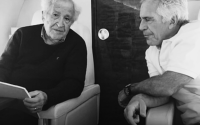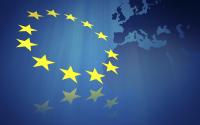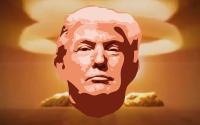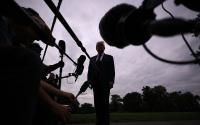30 December 2008
And this is why it's crucially important that people don't sit by waiting 'til Jan. 20. The calendar flipping is not going to change anything. What's going to change things is boycott, divestment and sanctions, people rising up and demanding an end to impunity, demanding, for example, that Ehud Barak, Ehud Olmert, Tzipi Livni be brought to account before an international war crimes court for the orders that they have given for these massacres of the civilian population of Gaza. That's what's going to bring change, and that's what people must call and organize for.
JG: I'd like to bring in Dr. Mustafa Barghouti, again. The issue of what is the potential for reaction in the West Bank and in the Arab street, as opposed to the complicity of many of the Arab governments at this point -- your sense of, if this continues much further, what will be the reaction?
MB: Well, let me explain one very specific point. Israel is very proud, with the complicity of some Arab regimes and some of the people in the Palestinian Authority, about what's going on. But I want to remind you that what is happening in Gaza and in the West Bank is nothing but also a slaughter of democracy. We have, as Palestinians -- we, the civil society in Palestine, we, the Palestinian democratic forces, jointly with many others -- managed to have the best democratic experience ever in the Arab world. Everybody knows that, and President Carter reported it when we had the last elections. And I think this complicity of some certain Arab sides are specifically because they don't want this democracy to happen. They don't want this democracy to survive. And if Israel is very proud to be in alliance with dictatorships, then that reveals how democratic Israel itself is.
Israel has been claiming that it's the only democracy and so on, but why is it slaughtering Palestinian democracy? They did that in 1976, when we had elections for the first time for our municipalities, and within one year, because they didn't like the elected people, they either bombarded them or deported them or arrested them. And now, after 2006 elections, they are putting 45 members of our parliament in jail. One of the leaders, one of the members of parliament, is not Hamas. His name is Ahmed Saadat. He's from the left, from the secular democratic left. He was just sentenced to 30 years in jail, just because he is the secretary-general of a Palestinian organization. It's amazing how the world is silent about this slaughter of democracy. And if Israel is happy with being in alliance with some dictator, then it is the one that is losing.
The main question here, that I want to come back to some myths that Israel is spreading. They keep stressing that they are attacking Hamas. This is not on Hamas; this is on the whole Palestinian population. They claim that they ended occupation in Gaza. This is not true. They never ended occupation in Gaza. They continue to occupy Gaza. Now they're changing the form of occupation again, and they're threatening to complete the invasion again and destroying people's lives. Third, they claim that it was the Palestinians who broke the ceasefire. This is false. This is incorrect. Israel broke the ceasefire. And now the party that is refusing to have ceasefire is Barak, the defense minister of Israel, and he's the one who is refusing to allow ceasefire to happen again.
At the same time, I must say that Israel is not only attacking the Gaza Strip. Practically, Israel in the West Bank has created a system that can only be described as an apartheid system, a much worse apartheid than the one that prevailed in South Africa at one point of time. Why do we have all these problems? For one very simple fact: The violence is a symptom of the disease. The disease has been there all the time, for 41 years, and it is the Israeli military occupation of the Palestinian territories. And because the Israeli government does not want to stop this occupation, that's why we keep running from one conflict into another. Please.
AG: I wanted to bring Gideon Levy back into the conversation from Tel Aviv from the Israeli newspaper Ha'aretz. Gideon, you write, "Blood will now flow like water. Besieged and impoverished Gaza, the city of refugees, will pay the main price. But blood will also be unnecessarily spilled on our side. In its foolishness, Hamas brought this on itself and on its people, but this does not excuse Israel's overreaction." What about -- can you elaborate on this?
GL: Yes, I think that Israel had this legitimacy to protect its citizens in the southern part of Israel, and it had the legitimacy to do something, as the Israelis all expect the government to do, but this doing something does not mean this brutal and violent operation. The diplomatic efforts were just in the beginning, and I believe we could have got to a new truce without this bloodshed.
And even about the military reaction, you know, there are all kinds of stages. Immediately to send dozens of jets to bomb a total helpless civilian society with hundreds of bombs -- just today, they were burying five sisters. I mean, this is unheard of. This cannot go on like this. And this has nothing to do with self-defense or with retaliation even. It went out of proportion, exactly like two-and-a-half years ago in Lebanon.
AG: Dr. Moussa El-Haddad in Gaza City, the responsibility of Hamas here and the response of the people of Gaza? Right now, a quote of Tzipi Livni, who just recently said, "Unfortunately, in this kind of attack, there are some civilian casualties, but Israel took all the necessary actions to warn the civilians before the attacks to leave the places they know that Hamas stays."
MH: Well, it's not some civilians. All those who are dead now, most of them are civilians. And a question that keeps coming up, people are saying Israel has the right to protect itself from the Hamas rockets. What about the West Bank? Does Hamas -- does West Bank has rockets that they throw on Israel? Of course, none. And look at what's happening in the West Bank, in Hebron, Nablus and Ramallah and everywhere. People are being killed almost every day. And I just cannot explain to you the situation right now.
Hamas, as an organization, was, as Dr. Barghouti just mentioned, this government was democratically elected in front of the eyes of the whole world, and this is the only democratic election that happened in the Middle East, really democratic. And people -- why just the world didn't give this government a chance to prove itself? It was not going to throw rockets or just -- when they had this truce and the ceasefire, who broke it? It was Israel. We had a siege for one-and-a-half months, nothing allowed in, no medicines, no food, no nothing. And still, Hamas and other organizations did not throw any rockets. Israel kept on coming, and they killed 23 people in three weeks. Of course, this provoked Hamas, and they just did not renew this issue of ceasefire, because it was useless.
JG: I'd like to ask also Fida Qishta back into the conversation -- this continuing occupation and encirclement and the problems that you face in Gaza, how do persevere, you and other residents there, day to day, manage to get through?
FQ: Well, for Palestinians, in general, they face a lot from the Israeli occupation. And if you don't find a house in the whole Gaza Strip that isn't damaged by losing a son or a father or a daughter or a mother -- we used to face lots of problems with the Israelis. And me, myself, I'm one of the people and a person who lost their house in 2004. We managed to continue our lives. We managed to build a new house, and now we survived. But the problem of the other people who can't build new houses or even afford food for their families.
Palestinians try to be strong. But under these attacks that the Israelis now -- actually, the war that Israelis started with Palestinians in Gaza, it's really unbelievable and not acceptable. It's genocide. And all the world should stop and say to Israel, "Stop it. That's enough. The Gazan people chose this government, and you should accept it." And for us, as Gazans, we try to continue our lives, no matter what happens. We keep the hope, and we keep the struggle for the future and for our families. We don't think, for example, if the Israelis destroy a house or kill a son or a daughter, that means our life is ended. We try to survive and continue our life. We try to do our best with it, but Israel is trying every single day, every single minute, to destroy the Palestinians' hope. And I don't know what these normal Palestinians did for them, what these civilians did for them. So we try to manage and continue our life. This is what we try to do. No matter what, we try to continue our lives.
AG: I want to go back to Ali Abunimah. The next step now? Israel is preparing for a ground invasion, calling up 6,500 troops. Do you hold Hamas responsible for any of this? What do you think Hamas should be doing now?
AA: Well, what could -- I mean, this thing about if they hadn't fired rockets, this was the Israeli propaganda that Mahmoud Abbas was repeating in Cairo. And as Dr. El-Haddad said, has one single rocket ever been fired from the West Bank? No. And as Dr. Barghouti was saying, the West Bank is under constant attack. People are being killed. Amy, you had on your show the settler pogroms that were happening in front of the eyes of the world in the West Bank, the settlement construction that goes on. There has not been a single rocket fired from the West Bank. Abbas has capitulated to the Israelis. His so-called security forces, trained by the United States and armed by the United States, have been fighting the resistance in the West Bank. Did that spare one single Palestinian in the West Bank from Israeli violence or colonization? No, it did not.
This notion that Israel has a right to defend itself -- against who? Against 1.5 million people who are refugees, who are starving, who are caged in the world's largest prison or concentration camp? Don't Palestinians also have a right to defend themselves? What should Palestinians do? I turn the question of those who keep pointing the finger at the Palestinians. Resistance is not acceptable, and so --
AG: Ali Abunimah, we're going to have to leave it there.
AA: Thank you, Amy.
AG: I thank you very much for being with us, Ali Abunimah in Florida; Dr. Moussa El-Haddad and Fida Qishta, both in Gaza; Dr. Mustafa Barghouti in Ramallah.






